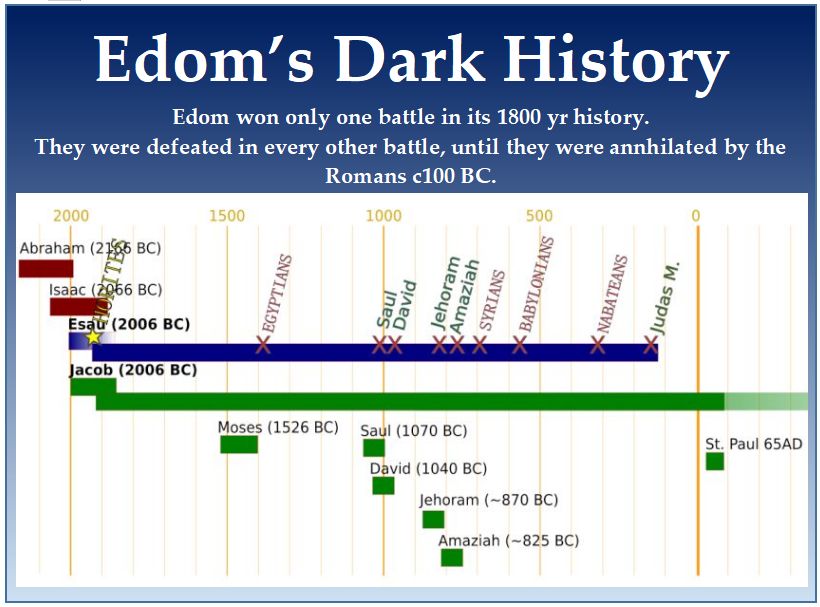
The Bible traces the people of Edom to Esau, son of Isaac and twin brother of Jacob, born approximately 2,000 BC. By the time of the Exodus in 1446 BC, the offspring of Esau had grown to be a respectably-sized nation, living in the lands of Seir, given to them by God (Deut 2:5). The battle they fought to gain the land is referenced in Genesis 36, and appears to be the only significant military victory in their entire history. From a military perspective, the rest of Edom’s history is rather bleak.
The terrain was mostly desert and mountains, roughly located southeast of the Dead Sea and northwest of the Arabian desert. It was along the route of the Israelites as they wandered for 40 years under Moses’ leadership. Each time Moses asked for permission to cross their lands, the Edomites denied them access, regardless of the fact that they were ‘brothers’ and had a shared ancestry. God stood by Edom’s right to rule their lands as they saw fit, so Moses and company had to detour around their territory.
Over the years, Edom had an on-again/off-again volatile relationship with the Israelites, and in roughly 1030 BC, King Saul brought them into submission (1 Sam 14:47). When they came roaring back, King David fought against them and almost wiped them out completely c. 1000 BC (2 Sam 8:13-14), making them vassals of Israel for most of the next two centuries.
When the Assyrians started their southern campaign in the 8th century BC, Edom got wolloped again and stayed under their yoke.
By the time Babylonian king Nebuchadnezzar attacked Jerusalem in 605BC, Edom was its vassal (Babylon conquered Assyria in the early 600s BC). The Edomites helped Nebuchadnezzar slaughter the Judeans (Ps 137), and for this, the prophets declared their continued oppression followed by Judean conquest and a violent doom at the hand of her enemies – all of which was to be orchestrated by God (Obadiah 1:11-14).
Shortly after their Babylonian oppression, they were overrun by nomadic tribes from their east, and those that remained migrated westward into Judea, where they began to be called Idumeans. But still, they could find no peace.
Towards the end of the Greek rule of the middle east, two Judean rulers subjugated the Edomites/Idumeans: Judas Maccabeus conquered their territory for a time around 163 BC, followed by John Hyrcanus c. 125 BC. Hyrcanus dissolved their lands and incorporated them into the Jewish nation.
By the time of the Roman Wars in 70 AD, the entire Idumean (Edomite) army scarcely numbered 5,000 men. They sided with the Jewish Zealots against the Romans, but were quashed and scattered by the vastly superior Roman military.
No further mention is made of them in Jewish or Roman history. After centuries of oppression, despite their efforts to rebuild their peoples and their lands, they eventually became a wasteland, inhabited only by ragtag groups of wandering desert nomads.

Here’s a list of battles Edom had throughout her ~1800 history (Source: IBSE):
- Edom conquered Horites of Seir and occupied their lands (Gen 36)
- (I came across an extra-Biblical reference to Egypt battling Edom during the Wilderness years prior to Moses arriving there in Deut 2, but I haven’t confirmed it)
- Saul conquered Edom (1 Samuel 14:47)
- David conquered 18,000 Edomites (2 Samuel 8:13)
- Joab conquered Edom after David’s victory (1 Kings 11:15)
- By the time Jehoshaphat was king, there was no king in Edom, only a deputy (1 Kings 22:47) who was subservient to Judah (2 Kings 3:9)
- Edom mounted a short-lived rebelled during Jehoram’s reign (2 Kings 8:20-22)
- Amaziah destroyed 10,000 Edomites and took the city of Selah (2 Kings 14:7)
- Uzziah restored the sea port of Elath for Judah, implying he conquered Edom (2 Kings 14:22)
- Rezin, a Syrian commander, conquered Elath, removed the Jews and subjugated the Edomites (2 Kings 16:6)
- Tiglath-pileser subdued Rezin adn took over Elath as a vassal state (cuneiform tablets)
- King Sennacherib continued Syrian reign over Edom, with Malik-ram paying homage to him
- Ezarhaddon continued Syrian reign over Edom
- Eventually, Edom assisted Nebuchadnezzar in his conquest of Jerusalem, mocking the suffering that Jerusalem was undergoing (Lam 4:21; Ezek 25:12; Ezek 35:3; Obad 1:10)
- In 300BC, Edom fell into the hands of the Nabateans, who were, in turn, conquered by the Romans
When considering how their plight is summarized in Malachi 1:2-5, it might be appropriate to not call them “less loved”, as the phrase simply doesn’t do justice to their history.
[+] “I have loved you,” says the LORD.
But you ask: “How have You loved us? ”
“Wasn’t Esau Jacob’s brother? ” This is the LORD’s declaration. “Even so, I loved Jacob, but I hated Esau. I turned his mountains into a wasteland, and gave his inheritance to the desert jackals.”
Though Edom says: “We have been devastated, but we will rebuild the ruins,” the LORD of Hosts says this: “They may build, but I will demolish. They will be called a wicked country and the people the LORD has cursed forever. Your own eyes will see this, and you yourselves will say, ‘The LORD is great, even beyond the borders of Israel.’ (Mal 1:2-5)

Leave a Reply